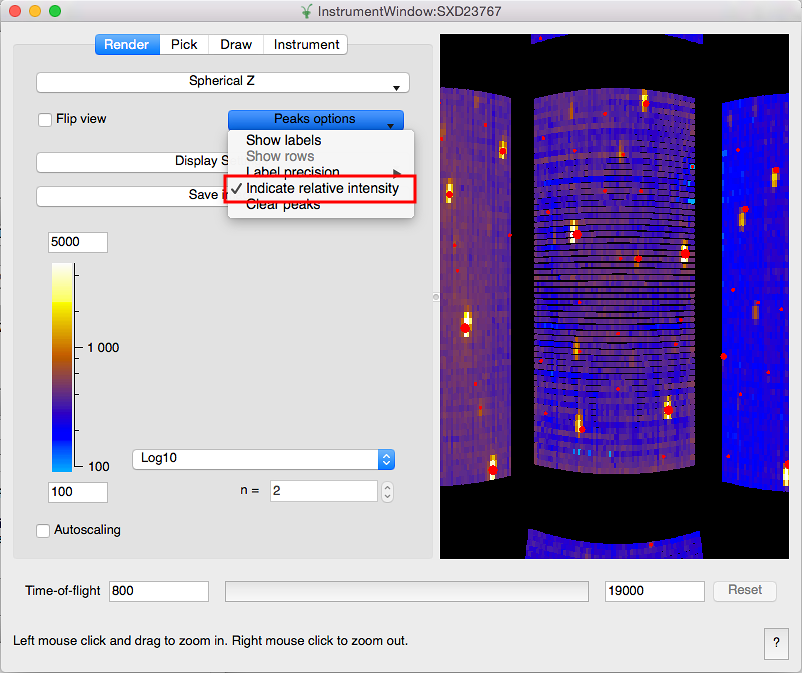\(\renewcommand\AA{\unicode{x212B}}\)
Diffraction Changes
- The instrument view has been modified to optionally display relative
peak intensities on a qualitative scale. The intensities are
indicated by markers of different size. The option is found in the
“Render”-tab of the instrument view:

- There is now an algorithm
LoadCIF
which loads crystal structure information from a CIF-file into the
sample associated to a workspace. Optionally, a UB-matrix can also be
loaded from the file.
- PredictPeaks
has been modified to optionally use the crystal structure information
to calculate structure factors for the predicted peaks.
- SortHKL
has received a major speedup for calculation of statistics for
PeaksWorkspaces with large numbers of peaks and/or high symmetry.
- New algorithm
PDToPDFgetN
which converts events files into suitable PDFgetN files.
- Various fixes and optimizations to make
SNSPowderReduction
run faster.
- New documentation page for the ISIS Powder Diffraction
with comprehensive workflow-diagrams and usage example.
- Many small changes made to the ISIS Powder Diffraction script to
enable smoother process, which can be discovered on the ISIS Powder Diffraction
documentation page.
- CrystalStructure has been exposed to Python, along with
ReflectionGenerator. Both can be used together to calculate HKL-lists
as well as d-spacings and structure factors for a given crystal
structure. Usage examples are included in a new documentation page.
- Alternative settings for space groups have been added, including
different cell choices for monoclinic space groups, rhombohedral
settings for trigonal space groups and origin choices. The documentation
has been updated.
- There is now a clear separation between crystal- and lattice system
within PointGroup. This is relevant for trigonal space groups which
can belong either to the rhombohedral or the hexagonal lattice
system. This change affects the functions LatticeFunction and
PawleyFunction, as well as the algorithm PawleyFit, which now use
lattice system instead of crystal system.
- CorrectIfOnEdge option was added to IntegratePeaksMD to estimate the
part of the peak off the detector edge.
- PoldiFitPeaks2D now correctly refines hexagonal cell parameters for
trigonal structures in hexagonal setting
(details)
- New functionality has been integrated in the Engineering diffraction
GUI (and the Engineering diffraction algorithms have been updated and
extended wherever needed):
- Multi-run processing
- Multi Runs Focus Mode combo-box enables user to carry out focusing
process by focusing Individual Run Files Separately or by focusing
the Sum Of Files
- Stop Focus button terminates the multi-run focussing process
- Basic support for event mode.
- Advanced calibration modes (cropped and texture).
- Additional plotting options for calibration and focusing results.
- A default calibration for EnginX is included with Mantid.
- Support for several output file formats (GSAS, OpenGenie, XYE
format).
- GUI has been made further more interactive and customisable; user
can now disable or enable particular functionality and features
upon preference
- The tomography reconstruction interface now supports the new
functionality introduced in recent versions of the reconstruction
tools Tomopy and Astra Toolbox.
- Scripts to aggregate energy bands have been added.
- Support for running third party tomographic reconstruction tools
locally.
- The GUI now provides an interface (new tabs) to simplify the
following tasks:
- set up pre-processing steps and filters.
- visualize sequences or stacks of images and select regions of
interest and regions for normalization.
- browse results produced by reconstruction tools and open them up
in external 3D visualization tools.
Full list of diffraction
and
imaging changes on GitHub.
